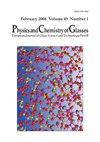玻璃是物质的一种状态吗?
IF 0.6
4区 材料科学
Q4 CHEMISTRY, PHYSICAL
Physics and Chemistry of Glasses-European Journal of Glass Science and Technology Part B
Pub Date : 2022-07-28
DOI:10.13036/17533562.63.5.15
引用次数: 7
摘要
玻璃无处不在。我们使用并被玻璃物体所包围,这些物体使玻璃作为一种独特的物质状态的现实变得有形。然而,我们所知道的玻璃通常是通过将液体迅速冷却到熔点以下以避免结晶而获得的。这种过冷液体的粘度在冷却时增加了许多数量级,直到液体在低于“玻璃化转变”温度的实验时间尺度上基本停止。从结构的观点来看,得到的玻璃仍然很像无序的液体,但从力学的观点来看,它和有序的晶体一样坚硬。玻璃有资格作为一种独立的物质状态吗?我们使用基本的统计力学概念来提供这个问题的教学视角。我们回顾物质状态和它们之间相变的定义。我们回顾了最近的理论结果,这些结果表明为什么以及如何将“理想玻璃”确实定义为物质的独立平衡状态。我们讨论了最近成功的计算机模拟,试图分析这种玻璃状态。我们以一些实验观点作为结束。本文章由计算机程序翻译,如有差异,请以英文原文为准。
Is glass a state of matter?
Glass is everywhere. We use and are surrounded by glass objects which make tangible the reality of glass as a distinct state of matter. Yet, glass as we know it is usually obtained by cooling a liquid sufficiently rapidly below its melting point to avoid crystallisation. The viscosity of this supercooled liquid increases by many orders of magnitude upon cooling, until the liquid becomes essentially arrested on experimental timescales below the ‘glass transition‘ temperature. From a structural viewpoint, the obtained glass still very much resembles the disordered liquid, but from a mechanical viewpoint, it is as rigid as an ordered crystal. Does glass qualify as a separate state of matter? We provide a pedagogical perspective on this question using basic statistical mechanical concepts. We recall the definitions of states of matter and of phase transitions between them. We review recent theoretical results suggesting why and how an ‘ideal glass’ can indeed be defined as a separate equilibrium state of matter. We discuss recent success of computer simulations trying to analyse this glass state. We close with some experimental perspectives.
求助全文
通过发布文献求助,成功后即可免费获取论文全文。
去求助
来源期刊

CiteScore
0.70
自引率
33.30%
发文量
0
审稿时长
1 months
期刊介绍:
Physics and Chemistry of Glasses accepts papers of a more purely scientific interest concerned with glasses and their structure or properties. Thus the subject of a paper will normally determine the journal in which it will be published.
 求助内容:
求助内容: 应助结果提醒方式:
应助结果提醒方式:


